Key takeaways:
- The complexity of global health issues is deeply tied to poverty, lack of resources, and education, impacting overall health outcomes.
- Healthcare education is vital for empowering communities, fostering resilience, and bridging health disparities.
- Effective health education strategies include storytelling, interactive activities, and leveraging technology for accessibility.
- Addressing barriers such as language and stigma is crucial to ensure inclusive and effective health education for diverse populations.
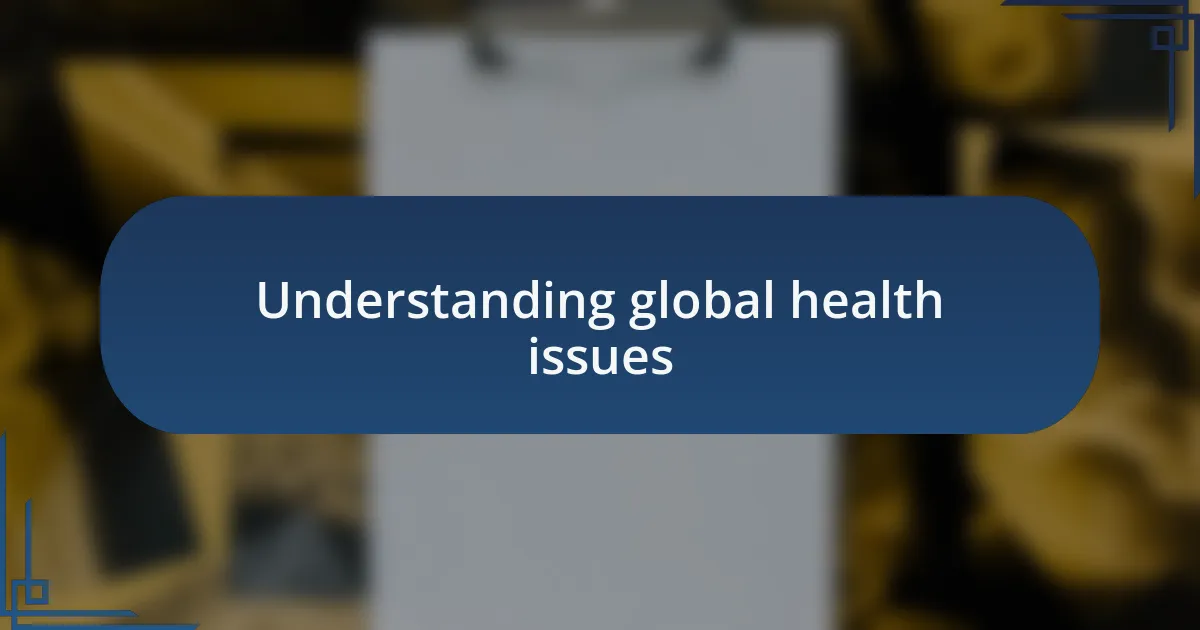
Understanding global health issues
When I first started learning about global health issues, I was struck by the sheer complexity of interrelated factors that affect health across different nations. For instance, when I volunteered in a rural health clinic abroad, I saw firsthand how poverty exacerbated health problems, limiting access to essential services. It made me wonder: how can we expect people to prioritize health when their basic needs are unmet?
As I delved deeper into global health, the impact of infectious diseases became glaringly apparent. In my travels, I encountered communities grappling with outbreaks that seemed preventable, yet they were often just a lack of resources away from a healthy society. It’s heartbreaking to realize that something as simple as access to clean water can be a matter of life or death for many.
Reflecting on these experiences, I’ve come to appreciate the role of education in addressing global health issues. I remember discussing health education programs with local leaders who were eager to change their communities’ health literacy. It made me ask myself: what can we do collectively to ensure that everyone, regardless of where they live, has the knowledge and resources to make informed health choices?

Importance of healthcare education
Healthcare education serves as the cornerstone of improving public health outcomes, as it empowers individuals to make informed decisions about their well-being. I remember attending a community workshop focused on nutrition and preventive care, where participants shared personal stories about their struggles. The newfound knowledge transformed our discussions, underscoring how education can directly influence lifestyle changes and health improvements.
In my experience, educated communities exhibit resilience in the face of health crises. For instance, during a health awareness campaign I participated in, I witnessed women rallying together to promote early disease detection. It was inspiring to see how sharing knowledge not only uplifted their spirits but also fostered a culture of proactive health management. This makes me ask: how can we scale these vital educational efforts globally?
The emotional weight of health disparities is heavy, but I believe that education can be the lifeline that bridges these gaps. When I observed parents learning about vaccination importance at a local clinic, their faces lit up with hope and determination. This glimpse into their journey made it clear to me: healthcare education is not just about facts and figures; it’s about fostering a healthier future for generations to come. How many more lives could be transformed if we prioritized education on a global scale?
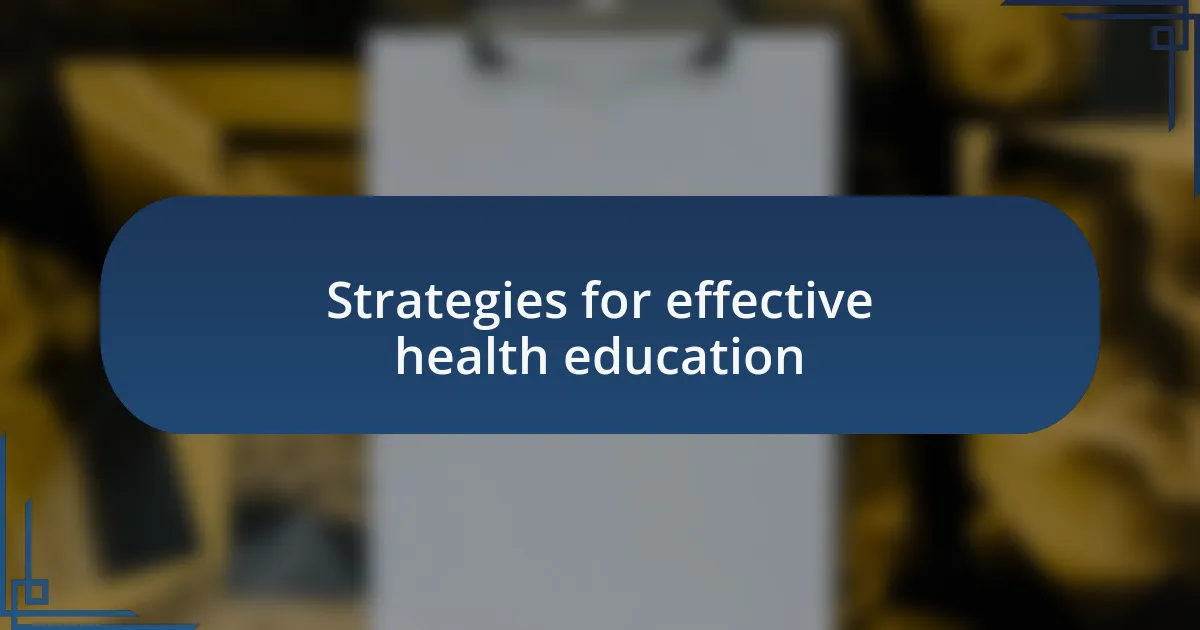
Strategies for effective health education
One effective strategy for health education is utilizing storytelling as a tool for engagement. I remember volunteering at a health fair where we encouraged attendees to share their health journeys. This approach not only made the information relatable but also sparked genuine conversations, allowing others to see reflections of their own struggles. How powerful it is when people hear real stories and realize they are not alone in their health challenges!
Incorporating interactive activities into health education can significantly enhance understanding and retention. During a workshop on diabetes management, I facilitated a hands-on cooking demonstration. Participants not only learned about healthy ingredients but also prepared a nutritious meal together, fostering a sense of community and collaboration. It was incredible to see their enthusiasm; they left with practical skills and renewed motivation to implement changes in their diets. Can educational experiences be any more impactful than when they combine knowledge with practical application?
Another important tactic is to leverage technology for broader reach and accessibility. I’ve seen firsthand how mobile health apps can empower individuals with health tracking and personalized education. In a project I worked on, we developed an app focusing on mental health resources for young adults. The feedback was overwhelmingly positive, as many expressed how convenient it was to access information at their fingertips. In our digitally connected world, can we afford to overlook the potential of technology in revolutionizing health education?
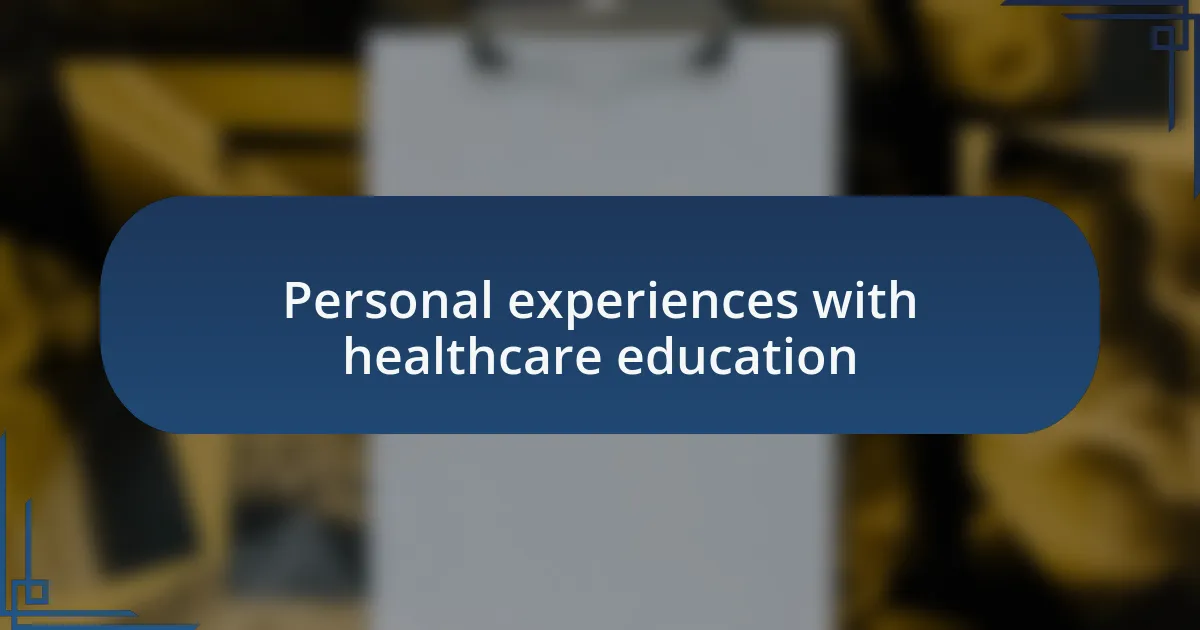
Personal experiences with healthcare education
During my journey in healthcare education, I often reflect on a particularly eye-opening experience while shadowing a nurse in a rural clinic. I witnessed the disparities in health literacy firsthand, as many patients struggled to understand their treatment plans. It struck me how critical it is to tailor health education to meet people where they are, ensuring information is not just available but truly comprehensible. How often do we overlook the importance of communicating in a way that resonates with diverse backgrounds?
I also recall a transformative moment during a community health workshop focused on preventive care. One participant shared her fear of seeking medical help due to past negative experiences. This revelation prompted a deeper discussion about trust in healthcare, and the need for inclusive education that addresses emotional barriers. It made me realize that effective health education goes beyond facts—it’s about empathy and fostering a supportive environment. Can we genuinely claim to educate if we ignore these emotional undercurrents?
Finally, I find volunteering with health education initiatives to be incredibly rewarding, especially when I see the enthusiasm in attendees. During a session on mental wellness, participants practiced mindfulness techniques, visibly lighter by the end. It reminded me how essential it is to create safe spaces for open dialogue about mental health, where individuals can share their thoughts and feel validated. Are we doing enough to encourage such conversations in our communities?
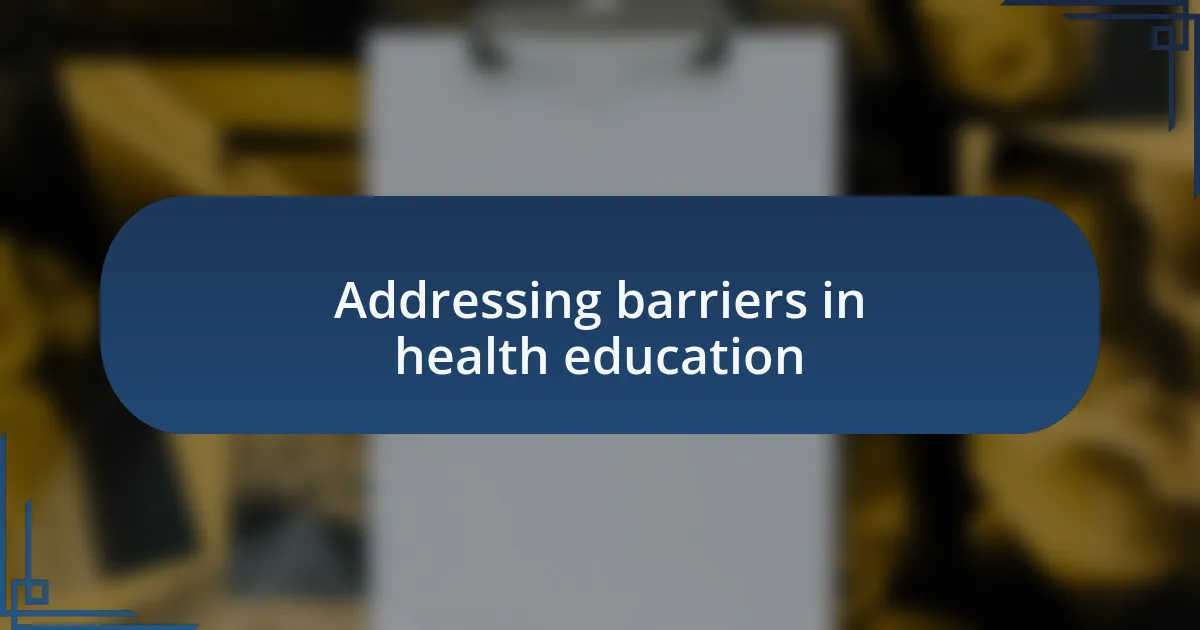
Addressing barriers in health education
Addressing barriers in health education requires a keen understanding of the varied factors that influence people’s access to information. I remember conducting a health fair in an underserved neighborhood, where I encountered individuals hesitant to engage due to language barriers. It became evident that providing materials in multiple languages and employing bilingual educators can significantly enhance participation and comprehension. How can we truly support diverse populations if we’re not equipped to communicate with them?
Another challenge I’ve observed is the stigma surrounding certain health topics, particularly mental health. During a seminar aimed at promoting dialogue about mental illness, I noticed participants were initially resistant to speak up. However, as trust developed, they began sharing personal stories of struggle and resilience. This experience underscored the importance of creating an environment that normalizes these discussions. Aren’t we missing an opportunity for growth and healing if we allow stigma to silence voices?
Lastly, I often reflect on the role of technology in breaking down educational barriers. When I volunteered to help facilitate online workshops, I witnessed firsthand how virtual platforms can reach individuals who might otherwise be isolated. It’s inspiring to think about the possibilities that arise when we harness technology to promote learning—yet I still wonder, are we utilizing these tools to their fullest potential in every community?
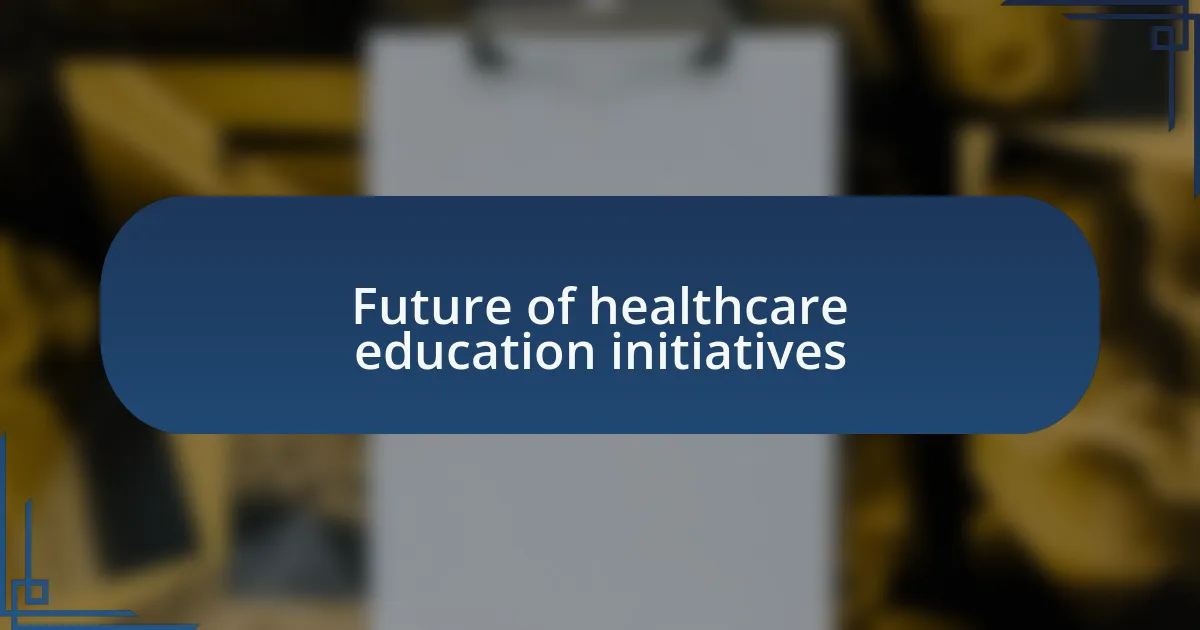
Future of healthcare education initiatives
As I contemplate the future of healthcare education initiatives, I can’t help but think about the potential for personalized learning experiences. In a recent workshop with nursing students, I saw how tailored content could significantly enhance their understanding of complex topics. Imagine the impact of curricula designed around each learner’s background and interests—wouldn’t that lead to deeper engagement and understanding?
Another area that excites me is interprofessional education. During a community health initiative, I collaborated with pharmacists, social workers, and doctors, and the synergy was remarkable. When various healthcare professionals learn together, they not only broaden their perspectives but also foster collaborative skills that are crucial in real-world scenarios. Aren’t we benefitting from sharing expertise rather than working in silos?
Additionally, the integration of simulation-based learning stands out to me as a key component for the future. I once participated in a simulated patient care scenario that transformed my approach to diagnosing issues. This hands-on experience builds confidence and prepares future healthcare providers for the complexities they will encounter on the job. How can we continue to innovate these techniques to ensure every learner is ready for the challenges ahead?